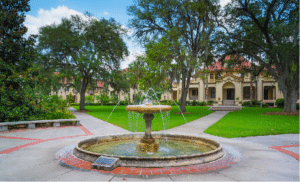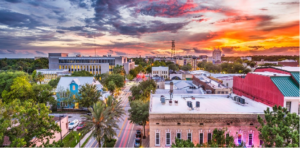
Living in Gainesville, FL: [Guide to Life in the Sunshine City]
Living in Gainesville, FL offers a vibrant and welcoming community for residents of all ages. Whether you are a student, young professional, or retiree, this lively city in Florida has something to offer everyone. With its charming downtown filled with unique shops and eateries, a thriving arts scene, and numerous outdoor recreational opportunities, Gainesville is truly a place where you can live, work, and play. So come and discover the charms of this friendly city, and see why so many people are choosing to call Gainesville home.

Understanding Gainesville’s Geography
Location in Florida
Gainesville is located in the northern part of Florida, about 75 miles southwest of Jacksonville and 80 miles northwest of Orlando. It is situated in Alachua County, which is bordered by the Santa Fe River to the north and the Payne’s Prairie Preserve State Park to the south. Additionally, Gainesville is positioned near the Gulf of Mexico, providing residents with easy access to beautiful beaches on the weekends.
Topography and climate
Gainesville’s topography is characterized by rolling hills, lush forests, and expansive farmland. The city enjoys a subtropical climate, with mild winters and hot, humid summers. From May to September, temperatures can often exceed 90 degrees Fahrenheit, while winters are mild and pleasant, with average temperatures in the 60s and 70s. Gainesville also experiences a good amount of rainfall throughout the year, which contributes to its green landscapes.
City layout and notable landmarks
Gainesville has a well-planned city layout, with its downtown area serving as the center of commerce, government, and entertainment. The downtown area is known for its charming historical buildings, trendy shops, and delicious restaurants. Notable landmarks in Gainesville include the University of Florida, which is one of the nation’s top public research universities, and the Kanapaha Botanical Gardens, which boasts an impressive collection of diverse plant species. Additionally, residents and visitors alike often enjoy exploring the Devil’s Millhopper Geological State Park, which features a unique sinkhole and stunning natural beauty.
Historical Background of Gainesville
Establishment of Gainesville
Gainesville was established in 1853, when the Florida Railroad Company laid tracks in the area, encouraging the development of a new town. The city was named after General Edmund P. Gaines, a hero of the Seminole Wars. Over the years, Gainesville grew steadily, attracting new residents and businesses, particularly with the establishment of the University of Florida in 1905.
Notable historical events
Gainesville has a rich and diverse historical past, with several notable events shaping its development. One of the most significant events was the Gainesville Race Riot of 1923, which occurred when a lynch mob attacked the predominantly African-American community of Rosewood. This tragic event highlighted the racial tensions of the time and had a lasting impact on the local community. Another noteworthy historical event was the desegregation of the University of Florida in 1958, when African-American students were admitted for the first time, marking a significant step towards equality.
Historical landmarks and attractions
Gainesville is home to numerous historical landmarks and attractions that provide insights into its past. The Thomas Center, a former hotel transformed into a cultural center, showcases beautiful architecture and offers exhibits on local history and art. The Matheson History Museum is another popular destination, featuring exhibits that chronicle Gainesville’s growth and development. Additionally, the Historic Haile Homestead, a preserved plantation house, allows visitors to step back in time and experience life in the 1850s.
Demographics and Culture
Population overview
Gainesville has a diverse and vibrant population. According to the latest census data, the city has a population of approximately 133,997. The community is a mix of university students, faculty, families, and retirees. This diverse population contributes to an inclusive and welcoming atmosphere in Gainesville.
Cultural Diversity
Gainesville is home to a rich tapestry of cultural diversity. The city embraces a variety of ethnicities, religions, and lifestyles. Residents can participate in cultural events and community organizations that celebrate this diversity. There are also various ethnic restaurants, markets, and festivals that offer the opportunity to experience different cultures through food, music, and art.
Festivals and cultural events
Throughout the year, Gainesville hosts numerous festivals and cultural events that showcase the city’s vibrant arts and music scene. One of the most iconic events is the Downtown Festival and Art Show, where artists from across the country gather to display their work. Other notable events include the Gainesville Latino Film Festival, the Spring Arts Festival, and the Downtown Jazz Festival. These events provide opportunities for residents and visitors to immerse themselves in different cultural experiences and celebrate the community’s rich artistic spirit.
Economy and Employment
Major industries in Gainesville
Gainesville’s economy is diverse, with several major industries driving its growth. The healthcare and biotechnology sectors are particularly prominent, with the University of Florida Health System serving as a major employer in the region. The university also contributes significantly to research and innovation in fields such as aerospace, engineering, and information technology. Additionally, the tourism industry plays a significant role in the local economy, attracting visitors to Gainesville’s natural attractions, historical sites, and cultural events.
Job opportunities
Gainesville offers a range of job opportunities across various industries. The university is a major employer, providing positions in education, research, and administration. Additionally, the healthcare sector offers numerous job opportunities, from nurses and doctors to laboratory technicians. The city also has a thriving entrepreneurial scene, with start-ups and small businesses contributing to job creation.
Economic Growth
Gainesville has experienced steady economic growth in recent years, thanks in part to the presence of the University of Florida. This growth has resulted in the development of new infrastructure, such as shopping centers, residential communities, and office spaces. The city’s commitment to fostering innovation and building a diverse economy positions it well for continued growth and development.
Cost of Living in Gainesville
Housing prices
Gainesville offers a range of housing options to suit various budgets. The average cost of housing in the city is lower than the national average, making it an affordable place to live. Rent prices for apartments range from around $800 to $1,500 per month, depending on the size and location. Home prices vary significantly, with options available for first-time buyers as well as those seeking more upscale properties.
Cost of utilities
The cost of utilities in Gainesville is typically reasonable. The average monthly expense for electricity, water, and garbage services can range from approximately $100 to $200, depending on the size of the residence and the season. Internet and cable services are also available at competitive prices from various providers.
Grocery and dining costs
Gainesville offers several grocery options, including national chains and local markets, providing residents with a variety of choices at different price points. The Cost of groceries in Gainesville is generally in line with the national average. When it comes to dining out, the city offers a diverse range of restaurants, catering to various tastes and budgets. From casual eateries to upscale dining establishments, residents can find options to suit their preferences, with prices varying accordingly.
Education in Gainesville
Public and private schools
Gainesville is renowned for its excellent education system. The Alachua County School District oversees public schools in the area, providing quality education from pre-kindergarten through high school. The city also offers a variety of private schools, catering to different educational philosophies and religious affiliations. These schools often have smaller class sizes and provide a more specialized educational experience.
Higher Education Institutions
Gainesville is home to the University of Florida, a prestigious public research university. The university offers a wide range of undergraduate and graduate programs, attracting students from all over the world. Additionally, Santa Fe College, a state college, provides affordable education and vocational training to students seeking associate degrees and technical certifications.
Adult and continuing education
Gainesville offers numerous opportunities for adult and continuing education. The University of Florida offers non-degree programs for individuals seeking personal enrichment or professional development. Santa Fe College also provides a Lifelong Learning program, where adults can explore various subjects and interests in a relaxed and supportive setting.
Healthcare Facilities
Hospitals and clinics
Gainesville is home to several hospitals and clinics, ensuring residents have access to quality healthcare services. The UF Health Shands Hospital is the primary medical center in the region, offering a wide range of medical specialties and advanced treatments. Other hospitals, such as North Florida Regional Medical Center, provide comprehensive healthcare services and specialized care.
Specialist medical services
Gainesville is known for its expertise in various medical specialties. The city is a hub for research and innovation, attracting renowned specialists in fields such as cardiology, oncology, neurology, and pediatrics. This concentration of medical expertise ensures that residents have access to comprehensive and advanced healthcare options.
Healthcare affordability
Gainesville is recognized for its relatively affordable healthcare costs compared to other major cities in Florida. Health insurance options are available through employers, government programs, and private providers. The University of Florida Health System also offers a range of services and programs that cater to individuals with limited financial resources, ensuring that healthcare remains accessible to all members of the community.
Transportation Options
Public transportation
Gainesville provides a convenient and reliable public transportation system operated by the Regional Transit System (RTS). The RTS buses serve various routes throughout the city, making it easy for residents to commute to work, school, and other destinations. The bus service is well-maintained, and affordable, and offers discounted fares for students and seniors.
Driving and roads
Gainesville has a well-developed road infrastructure that makes driving a convenient option for residents. The city is served by major highways, such as Interstate 75, which connects Gainesville with other cities in Florida. The road network within the city is well-maintained, and traffic congestion is generally not a significant issue, except during peak hours.
Cycling and pedestrian infrastructure
Gainesville is a bicycle-friendly city, with an extensive network of bike lanes and trails. Many residents choose cycling as a means of transportation, as well as for recreational purposes. The city also prioritizes pedestrian safety by providing well-maintained pathways and sidewalks, making walking an enjoyable and convenient option for short distances.
Leisure and Recreation
Public parks and green spaces
Gainesville boasts a plethora of public parks and green spaces, providing residents with plenty of opportunities for outdoor recreation and relaxation. Some popular parks include the Gainesville-Hawthorne State Trail, Paynes Prairie Preserve State Park, and Depot Park. These spaces offer scenic trails for hiking and biking, picnic areas, playgrounds, and opportunities for wildlife viewing.
Sports facilities and events
Sports enthusiasts in Gainesville can enjoy a variety of recreational activities and organized sporting events. The city has numerous sports facilities, such as the Stephen C. O’Connell Center, which hosts basketball games and other sporting events. Gainesville is also well-known for its passionate support of the University of Florida Gators, who compete in various collegiate sports.
Performing arts and music scene
Gainesville has a thriving performing arts and music scene. The Curtis M. Phillips Center for the Performing Arts hosts a wide range of performances, including theater productions, musical concerts, and dance performances. The city is also famous for its local music scene, with several venues showcasing talented musicians across various genres.
Museums and galleries
For those seeking cultural enrichment, Gainesville offers a variety of museums and galleries. The Florida Museum of Natural History houses exhibits on the state’s natural and cultural heritage, including fossils, ancient artifacts, and interactive displays. The Harn Museum of Art showcases a diverse collection of artwork from around the world. Additionally, the Cade Museum for Creativity and Invention inspires creativity through interactive exhibits and educational programs.
Conclusion
Living in Gainesville offers numerous advantages and a few considerations, depending on individual preferences. The city’s prime location in Florida provides easy access to beautiful beaches, while its rolling hills, forests, and natural parks offer abundant opportunities for outdoor activities. The presence of the University of Florida adds vibrancy and intellectual stimulation to the community, as well as a diverse range of cultural and sporting events.
While there are many advantages to living in Gainesville, residents do face some challenges. The hot and humid climate during the summer months may not be suited to everyone’s preferences. Traffic congestion can occasionally be a concern, particularly during peak hours. However, overall, residents appreciate the city’s friendly atmosphere, diverse cultural scene, and the sense of community that Gainesville offers.


![20 BEST Hotels in Gainesville, Florida [2023 UPDATED]](https://www.exploreist.com/wp-content/uploads/2019/10/Best-Hotels-in-Gainesville-300x184.png)
![20 BEST Parks in Gainesville, Florida [2023 UPDATED]](https://www.exploreist.com/wp-content/uploads/2019/09/Best-Parks-in-Gainesville-300x168.jpg)
![20 BEST Restaurants in Gainesville, FL [2023 UPDATED]](https://www.exploreist.com/wp-content/uploads/2019/09/best-restaurants-in-gainesville-300x199.png)





